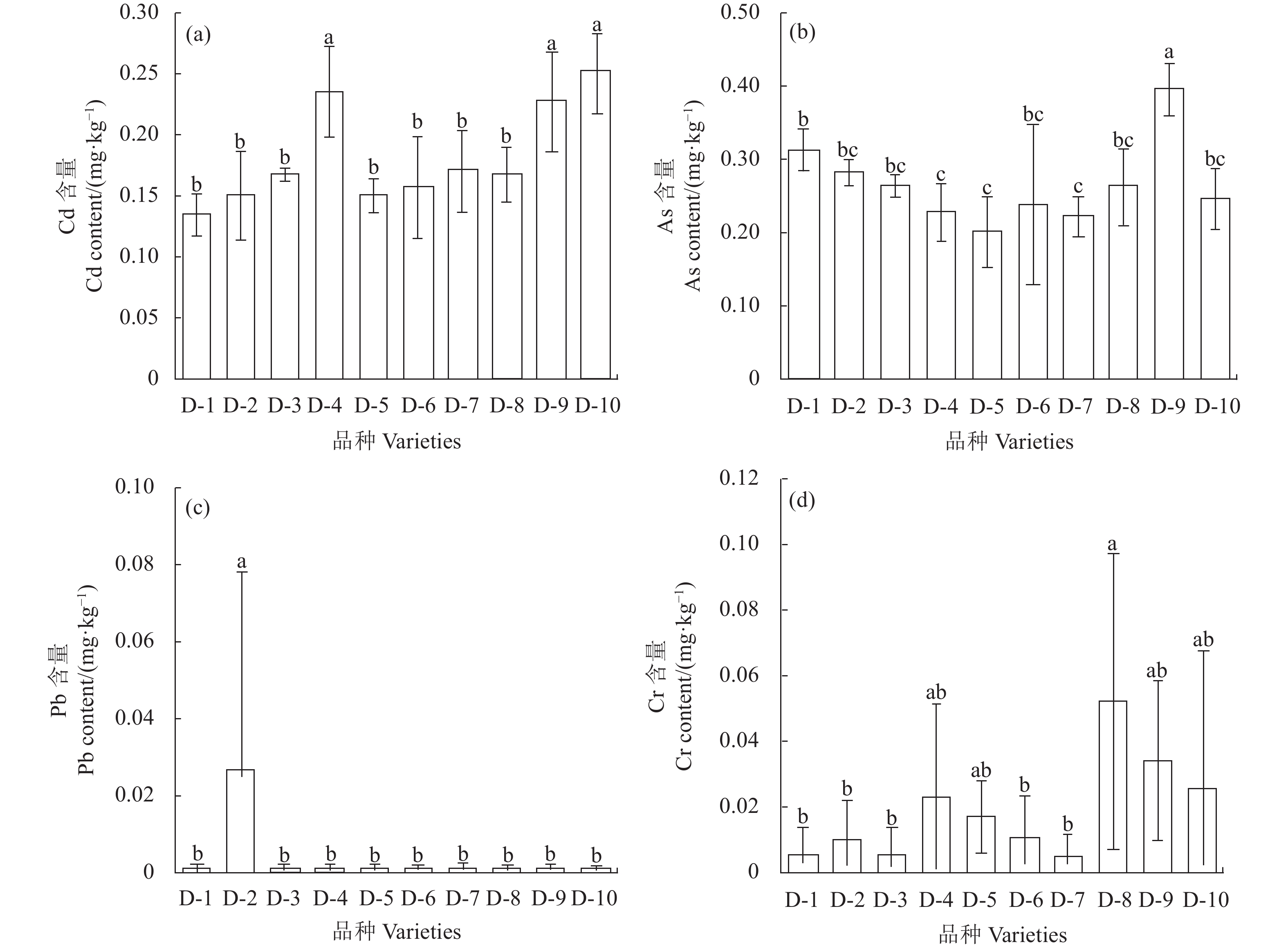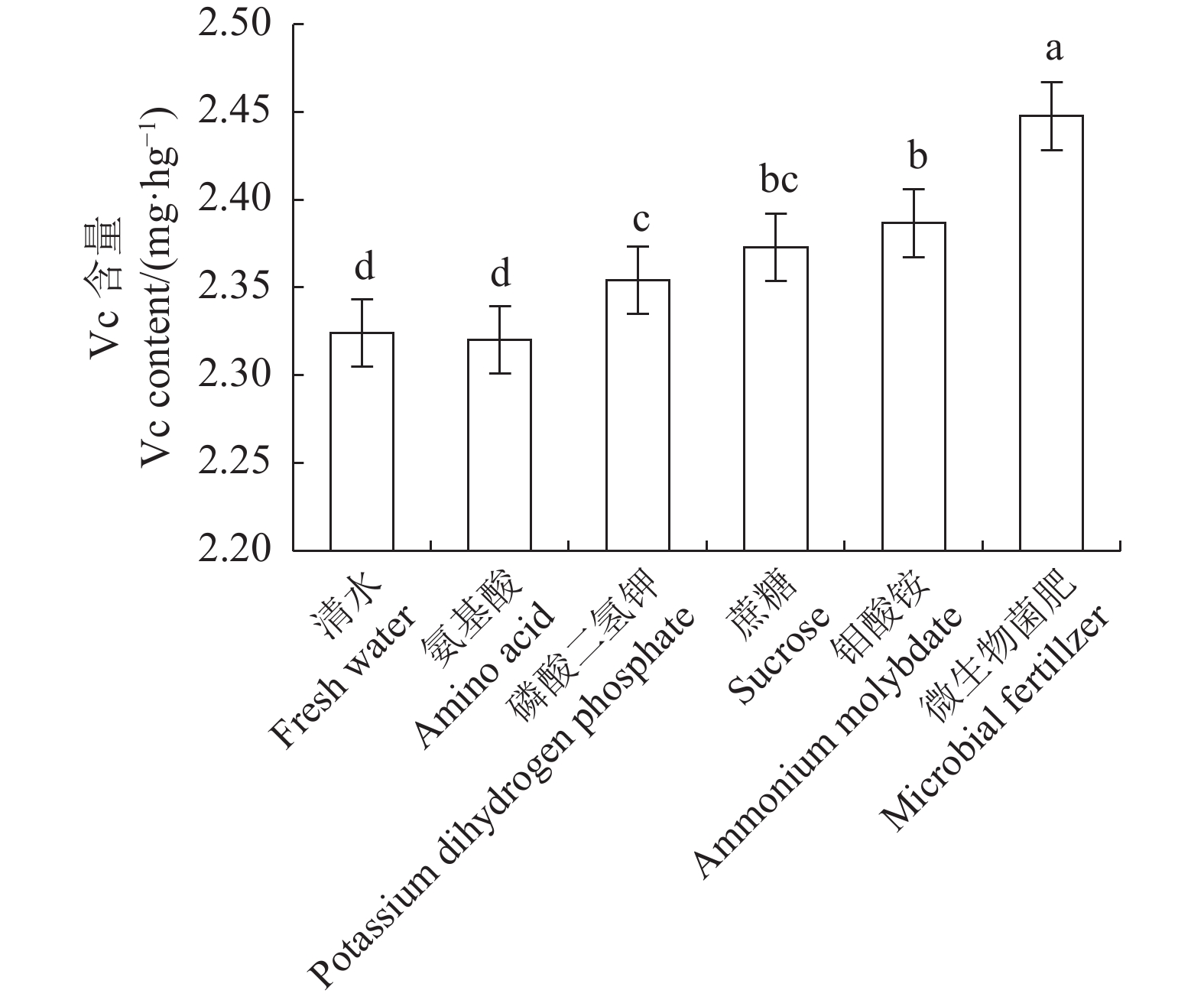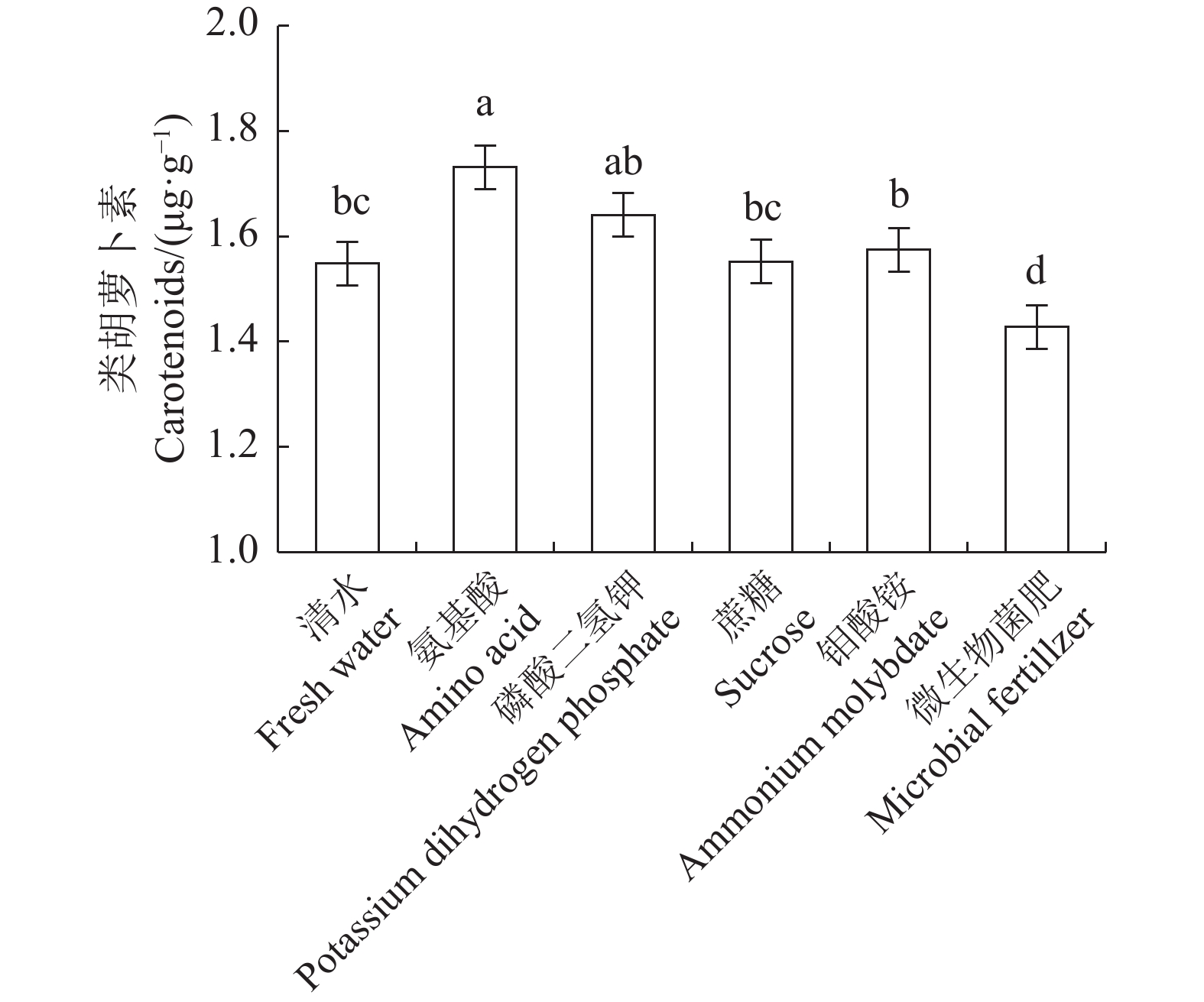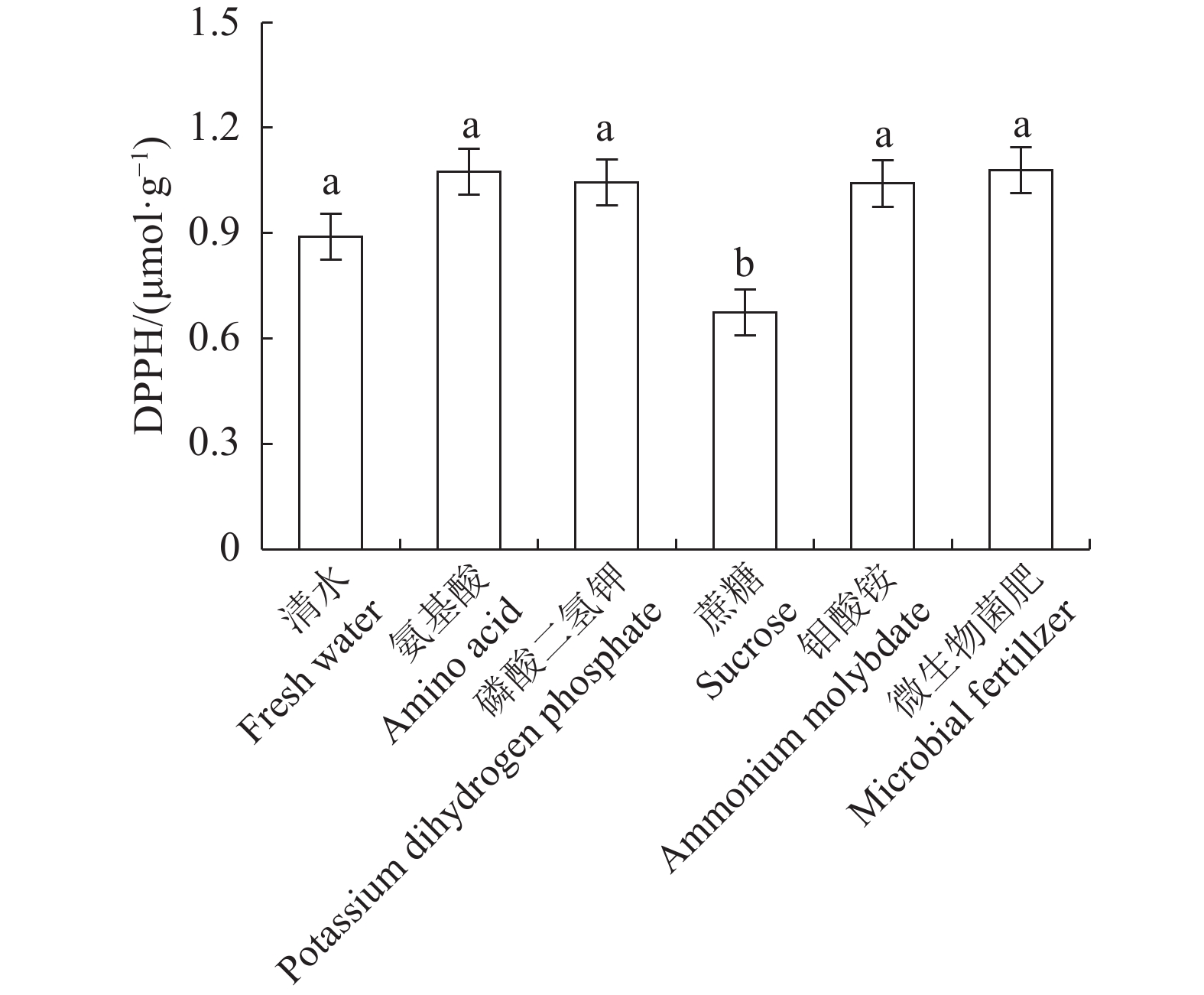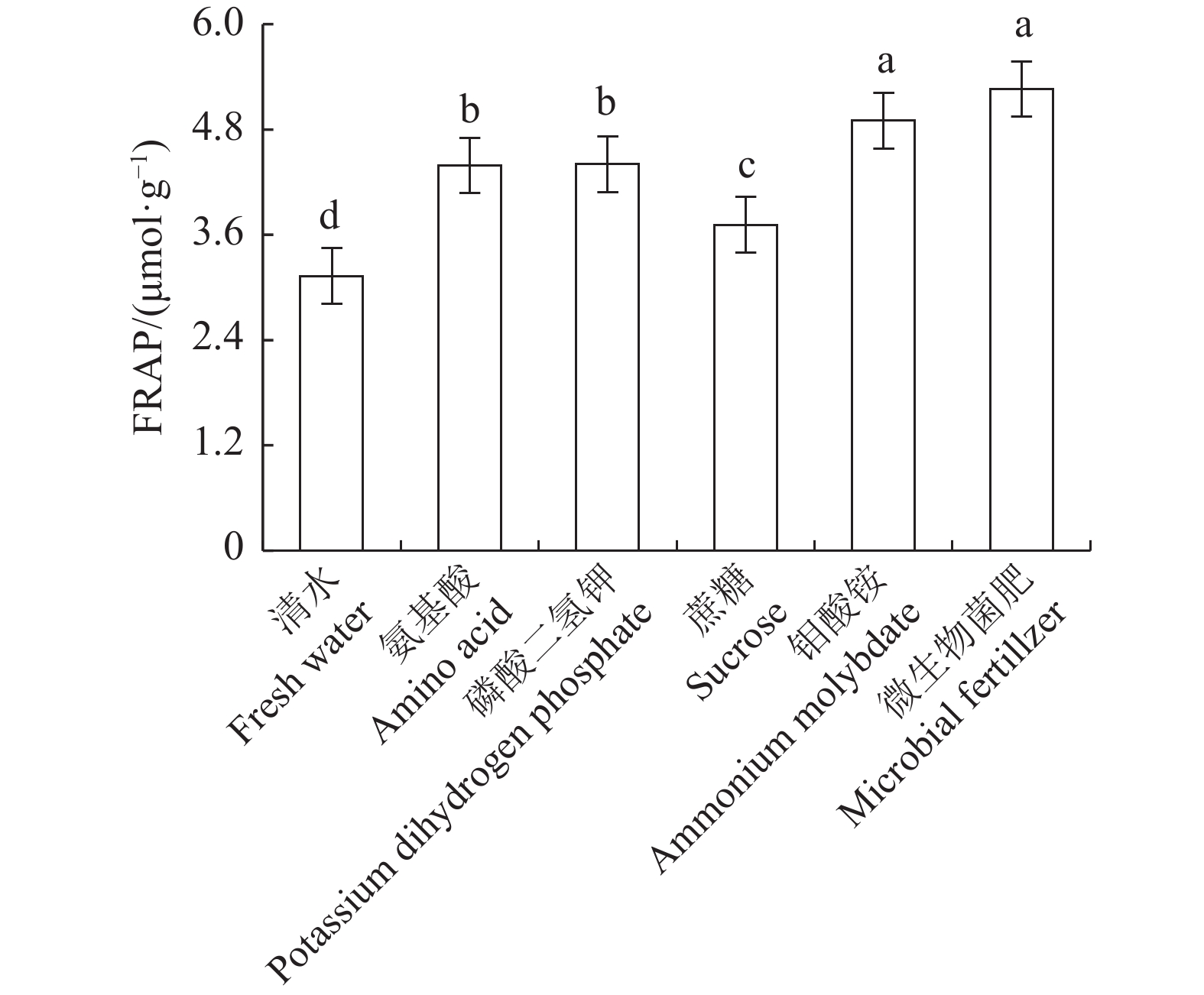Effect of Foliar Fertilizer Application on Loquat Fruit Quality
-
摘要:目的 研究喷施不同叶面肥对枇杷果实品质的影响,为生产栽培中改善果实品质提供技术支撑。方法 以5-8-1枇杷为材料,在果实采前30d进行不同叶面肥(清水、氨基酸500倍液、微生物菌肥200倍液、0.6%磷酸二氢钾、0.1%钼酸铵和5 g·L−1蔗糖)6种喷施处理,测定处理后枇杷果实色差、单果重、硬度、可溶性固形物、可溶性糖、可滴定酸、Vc、酚类物质、抗氧化活性等指标。结果 与清水对照相比,5种叶面肥处理后均能提升枇杷的单果重、可溶性固形物、可溶性糖、类胡萝卜素含量和糖酸比,同时降低可滴定酸的含量;除氨基酸处理外,对Vc含量也有显著性的提升;除磷酸二氢钾、钼酸铵处理外,果皮的a*、b*值也均有一定的提升。叶面肥喷施都显著性提升了枇杷果实总酚、总黄酮含量,其中以微生物菌肥提升的效果最明显;氨基酸、磷酸二氢钾、钼酸铵、微生物菌肥处理后的DPPH分别提高了20.92%、17.44%、17.10%、21.26%,FRAP分别提高了40.26%、40.56%、56.55%、68.05%。结论 5种叶面肥喷施处理均能在一定程度上提升5-8-1枇杷果实外在与内在品质,其中微生物菌肥200倍液的综合效果最佳。Abstract:Objective To study the effect of spraying different foliar fertilizers on loquat fruit quality, and provide technical support for improving fruit quality in production and cultivation. o study the effect of Spraying Different Foliar Fertilizers on loquat fruit quality, and provide technical support for improving fruit quality in production and cultivation.Method On 5-8-1 loquat plants, solutions of foliar fertilizers (i.e., 500-fold dilution of an amino acid, 200-fold dilution of a microbial fertilizer, 0.6% potassium dihydrogen phosphate, 0.1% ammonium molybdate, and sucrose at a 5 g·L−1 application rate) and water as control were separately sprayed on the leaves 30 d before harvest. The individual weight, firmness, chromatic aberration, and contents of soluble solids, soluble sugars, titratable acid, vitamin C, and total phenols as well as antioxidant capacity of the loquat fruits at harvest were measured.Result The spraying of foliar fertilizers increased the loquat fruit weight, soluble solids, soluble sugar, carotenoids, and sugar-acid ratio but reduced the titratable acid as compared with control. Except for the amino acid, all applications also significantly increased the Vc content. And aside from the potassium dihydrogen phosphate and ammonium molybdate treatments, the spraying enhanced the peel colorimetric a* and b*. The microbial fertilizer significant increased total phenols and flavonoids in the fruit, while the amino acid, potassium dihydrogen phosphate, ammonium molybdate, and microbial fertilizer, respectively, produced 20.92%, 17.44%, 17.10%, and 21.26% higher DPPH and 40.26%, 40.56%, 56.55%, and 68.05% more FRAP over control.Conclusion The 5 foliar fertilizing agents tested in the study upgraded the loquat fruit quality to varying extends. Overall, the application using a 200-fold dilution of the microbial fertilizer was recommended.
-
Keywords:
- Foliar fertilizer /
- loquat /
- fruit quality /
- antioxidant activity
-
0. 引言
【研究意义】土壤污染是当前我国乃至世界共同存在的环境污染问题,由于经济发展需求,人类的扰动破坏了土地原本的生态平衡,导致环境质量恶化[1]。通过颁布《土壤污染防治行动计划》,国家明确规定了在2020年和2035年被污染耕地安全利用率至少达90%和95%[2]。2014年,全国土壤环境质量公报显示,我国有19.4%的耕地土壤受到Cd、Pb、As、Cr、Hg等潜在有毒重金属污染[3]。水稻是广西主要的粮食作物,目前广西耕地土壤重金属污染严重,而且是多种重金属复合污染[4-5]。重金属污染土壤上水稻重金属含量状况不容忽视,自治区政府对水稻田土壤重金属污染问题高度重视[4]。因此,开展水稻重金属低积累技术及重金属污染水稻田修复研究,对实现重金属污染水稻田安全利用和粮食安全生产具有十分重要的意义。【前人研究进展】目前,减少重金属向水稻迁移和累积主要有两种方法,一是通过向土壤施用钝化剂使土壤重金属钝化或者叶面施用阻控剂来减少重金属向水稻迁移;另一种是筛选出适宜在当地种植的重金属低积累水稻品种来减少水稻体内的重金属含量[6-7]。有研究表明[8],不同水稻品种基因型不同,对As、Zn、Cd等重金属元素的富集能力存在明显差异。不同水稻品种对 Pb、Hg 的耐性和富集能力存在显著的基因型差异[9],通过不同品种水稻对重金属富集的差异,可以筛选出适应于在中低重金属污染稻田种植的低累积型水稻品种[10]。文典等[7]通过重金属低积累水稻品种筛选和化学修复手段结合的农田安全利用技术研究发现,采用化学钝化剂联合低累积水稻品种对减少稻米Cd含量效果显著,降低率40%~70%。水稻对土壤主要重金属镉、铅、铜、锌的富集规律研究发现,糙米对镉的富集系数最高,但影响糙米对镉富集的因素较为复杂,铅从土壤到糙米的迁移能力逐渐降低[11]。施用阻控剂可以有效降低水稻籽粒中的重金属含量[12-13]。学者研究发现水稻叶面喷施硅肥和硒肥可以显著降低稻米中Cd含量[13],有研究发现,补施硒肥可有效降低稻米中Pb、Cd、Cr、Hg等重金属含量,提高籽粒营养成分,施用适量叶面肥可以有效降低水稻体内重金属的含量,但不同水稻品种施用叶面肥对水稻积累重金属的影响有所不同[14-16]。【本研究切入点】目前关于不同水稻品种对重金属迁移和积累的差异,主要是以研究筛选水稻Cd低累积品种为主,而对于As、Pb、Cr低累积水稻品种的报道较少[14, 16],而事实上土壤环境中重金属的污染常是多种重金属的复合污染[17-18]。且目前关于水稻品种筛选和叶面肥组合处理对多个重金属的影响报道较少[14, 16]。【拟解决的关键问题】本研究在广西德保县某重金属污染水稻田进行,选用10个广西主要种植的水稻品种,以及含有硒元素、硅元素的两种叶面肥,通过大田试验分析水稻糙米Cd、As、Pb、Cr等4种重金属的影响,了解不同水稻品种对重金属Cd、As、Pb、Cr的累积情况,施用叶面肥对水稻糙米累积重金属的影响,为安全利用重金属污染稻田区域提供研究基础,为水稻粮食安全生产提供试验依据。
1. 材料与方法
1.1 试验设计
本研究在广西德保县某重金属污染水稻田进行。试验选用10个(表1)广西广泛种植的晚稻品种,每个品种设置施用含硒叶面肥(Se)(处理A)、含硅叶面肥(Si)(处理B)及CK等3个处理,完全随机区组试验,一共30个处理,120个小区,每个小区面积为20 m2。2020年7月25日播种前施用复合肥做基肥[每个小区施用6 kg,(N+P2O5+K2O)≥48%,质量比为N:P2O5:K2O=26:10:12]。2020年8月3日,进行人工移植。2020年9月21日,原液稀释100倍后采用人工喷洒的方式喷洒叶面肥,10月4日,按照第一次的浓度进行第二次喷洒。德保试验田土壤pH为7.66,总镉含量为2.33 mg·kg−1,总砷含量为10.86 mg·kg−1,总铬含量为0.35 mg·kg−1,铅含量为67.32 mg·kg−1。硒肥主要成分为有机硒(有机硒≥85 g·L−1),其余组分为水不溶物(≤10 g·L−1)、Na(≤10 g·L−1);硅肥主要成分为有机硅(有机硅≥120 g·L−1),其余组分为N、P2O5、K2O,(N+P2O5+K2O)≥170 g·L−1。两种阻控剂Cd含量均<10 mg·kg−1,Hg含量均<5 mg·kg−1,As含量均<10 mg·kg−1,Pb含量均<10 mg·kg−1,Cr含量均<50 mg·kg−1。
表 1 供试水稻品种Table 1. Rice varieties under study品种 Varieties 编号Number 来源Source 桂育12
Guiyu 12D-1 当地农资店
Local agricultural materials store华浙优1号
Huazheyou No.1D-2 广西农科院提供
Provided by Guangxi Academy of Agricultural Sciences68优金占
68 YoujinzhangD-3 凯丰优158
Kaifengyou 158D-4 裕丰优158
Yufengyou 158D-5 y两优143
y Lliangyou 143D-6 荃香优822
Quanxiangyou 822D-7 又香优龙丝苗
Youxiang youlongsimiaoD-8 又香优雅丝苗
Youxiang youyasimiaoD-9 野香优明月丝苗
Yexiangyou mingyuesimiaoD-10 1.2 采样方法与样品分析
2020年11月在水稻进入收获期后,每个小区采用五点法混合采样5株水稻样品,先用离子水冲洗干净,在水稻自然风干后,脱壳成糙米。所有植物样品粉碎后用自封袋保存。在采集植物样品的同时,每个小组采集一个土壤混合样品,样品自然风干后,研磨过100目筛装入自封备用。所有样品交由广西西大检测有限公司检测重金属总含量(As为无机砷)(对于未检出的数据均采用检出限值0.001 mg·kg−1表示,样品中仅重金属Pb存在未检出)。重金属的富集按下列公式计算:
富集系数(BCF)= m1/m2
式中,m1为植株重金属含量(mg·kg−1);m2为土壤重金属含量(mg·kg−1)。
1.3 数据分析
运用 IMB SPSS 19.0进行数据分析统计,通过Duncan法进行显著差异性分析(重金属Cr、Pb部分通过Duncan法和最小显著性差异LSR法两种分析方法结合进行显著性分析)。通过Microsoft Office Excel 2016 进行图的制作。
2. 结果与分析
2.1 不同品种水稻糙米重金属含量
图1(a)所示,10个品种水稻糙米Cd含量在0.1350~0.2520 mg·kg−1,均值为0.1812 mg·kg−1,水稻糙米Cd含量最低的品种是桂育12,含量最高的品种是野香优明月丝苗,其中凯丰优158、又香优雅丝苗、野香优明月丝苗3个品种水稻糙米Cd含量显著高于其他品种。10个品种水稻中,共有3个水稻品种Cd含量超过GB/T 5009.15-2014(≤0.2 mg·kg−1)。图1(b)所示,10个品种水稻糙米As含量在0.2000~0.3950 mg·kg−1,均值为0.2643 mg·kg−1,水稻糙米As含量最低的品种是裕丰优158,含量最高的品种是又香优雅丝苗,其中桂育12、又香优雅丝苗两个品种水稻糙米As含量显著高于凯丰优158、裕丰优158、荃香优822。10个品种水稻中,共有9个水稻品种As含量超过GB/T 5009.11—2014(≤0.2 mg·kg−1)。图1(c)所示,10个品种水稻糙米Pb含量在0.0010~0.0268 mg·kg−1,均值为0.0036 mg·kg−1,10个品种水稻中,仅有华浙优1号检测出Pb含量,且10个水稻品种Pb含量远低于GB/T 5009.12—2014(≤0.2 mg·kg−1)。图1(d)所示,10个品种水稻糙米Cr含量在0.0046~0.0521 mg·kg−1,均值为0.0185 mg·kg−1,水稻糙米Cr含量最低的品种是荃香优822,含量最高的品种是又香优龙丝苗,又香优龙丝苗水稻糙米Cr含量显著高于桂育12、华浙优1号、68优金占、Y两优143、荃香优822等5个品种。10个品种糙米Cr含量均远低于GB/T 5009.123—2014(≤1.0 mg·kg−1)。
2.2 不同叶面肥处理对水稻糙米重金属含量的影响
表2 所示,经过叶面肥处理后,10个品种水稻糙米Cd含量均低于对照组,糙米Cd含量均低于国家标准要求GB/T 5009.15—2014(≤0.2 mg·kg−1)。喷洒硒肥(Se)和喷洒硅肥(Si)后,10个品种水稻糙米Cd含量均值分别为0.1000 mg·kg−1和0.1010mg·kg−1,含量均显著低于对照组Cd含量0.1812 mg·kg−1,除华浙优1号和y两优143两个品种外,其他品种喷洒硒肥(Se)和喷洒硅肥(Si)后糙米Cd含量均显著低于其对照处理。由表3 所示,喷洒硒肥(Se)后,10个品种水稻糙米As含量在0.1900~0.2850 mg·kg−1,平均值为0.2195 mg·kg−1,显著低于对照处理0.2643 mg·kg−1,相较于对照处理含量降低了17.1%,其中除裕丰优158外,其他水稻品种糙米As含量均低于对照处理,且桂育12糙米As含量显著低于其对照处理;喷洒硒肥(Se)后,仅野香优明月丝苗、荃香优822、凯丰优158、Y两优143等4个品种糙米As含量低于GB/T 5009.11—2014(≤0.2 mg·kg−1)。喷洒硅肥(Si)后,10个品种水稻糙米As含量在0.1425~0.2650 mg·kg−1,平均值为0.1850 mg·kg−1,显著低于对照处理0.2643 mg·kg−1,相较于对照处理含量降低了30.0%,10个品种水稻糙米As含量均低于对照组,且桂育12和68优金占糙米As含量显著低于对照处理。喷洒硅肥(Si)后,除又香优雅丝苗外,其他9个品种糙米As含量均低于GB/T 5009.11—2014(≤0.2 mg·kg−1)。表4所示,经过叶面肥处理后,10个品种水稻糙米中仅有喷洒硅肥(Si)处理中,品种桂育12检测出Pb含量,且相较于对照处理0.001 mg·kg−1(检出线)升高了1580%,但与对照相比差异不显著。施用硒叶面肥(Se)(处理A)、施用硅叶面肥(Si)(处理B)及CK等3个处理,10个水稻品种Pb含量均远低于GB/T 5009.12—2014(≤0.2 mg·kg−1)。如表5所示,10个品种喷施叶面肥后糙米Cr含量相较于对照处理有明显差异,但差异不显著。喷洒硒肥(Se)后,10个品种水稻糙米Cr含量在0.0076~0.0741 mg·kg−1,平均值为0.0257 mg·kg−1,相较于对照处理0.0185 mg·kg−1含量增加了39.1%,但差异不显著。喷洒硅肥(Si)后,10个品种水稻糙米Cr含量在0.0039~0.0361 mg·kg−1,平均值为0.0183 mg·kg−1,相较于对照处理0.0185 mg·kg−1,含量降低了1.2%。施用硒叶面肥(Se)(处理A)、施用硅叶面肥(Si)(处理B)及CK等3个处理,10个水稻品种Cr含量均远低于GB/T 5009.123—2014(≤1.0 mg·kg−1)。
表 2 不同处理水稻糙米Cd含量Table 2. Cd content of brown rice under treatments品种
VarietiesCK 处理A Treatment A 处理B Treatment B 含量
Content/(mg·kg−1)含量
Content/(mg·kg−1)降幅
Decline/%含量
Content/(mg·kg−1)降幅
Decline/%D-1 0.1350±0.0173 a 0.0900±0.0141 b −33.3 0.0825±0.0150 b −38.9 D-2 0.1500±0.0365 a 0.0950±0.0054 a −36.7 0.0975±0.0450 a −35.0 D-3 0.1675±0.005 a 0.0975±0.025 b −41.8 0.0975±0.0125 b −41.8 D-4 0.2350±0.0369 a 0.1025±0.0095 b −56.4 0.1025±0.020 b −56.4 D-5 0.1500±0.0141 a 0.0975±0.0325 b −35.0 0.0950±0.0173 b −36.7 D-6 0.1575±0.0411 a 0.1275±0.0530 a −19.0 0.1400±0.0315 a −11.1 D-7 0.1700±0.0336 a 0.1000±0.0291 b −41.2 0.0850±0.0054 b −50.0 D-8 0.1675±0.0221 a 0.1050±0.0253 b −37.3 0.0975±0.0170 b −41.8 D-9 0.2275±0.0403 a 0.0825±0.0093 b −63.7 0.0950±0.0191 b −58.2 D-10 0.2520±0.0346 a 0.1025±0.0184 b −59.3 0.1175±0.0330 b −53.4 平均值 Average 0.1812±0.047 a 0.1000±0.0254 b −44.8 0.1010±0.0264 b −44.3 同行数据后不同小写字母表示不同处理间差异显著(P<0.05),下同。
Data with different letters on the same column indicate significant difference between different varieties (P<0.05). Same for the following tables.表 3 不同处理水稻糙米As含量Table 3. As content of brown rice from different treatment groups品种
VarietiesCK 处理A Treatment A 处理B Treatment B 含量
Content/(mg·kg−1)含量
Content/(mg·kg−1)降幅
Decline/%含量
Content/(mg·kg−1)降幅
Decline/%D-1 0.3125±0.0298 a 0.2250±0.0443 b −28.0 0.1425±0.0614 c −54.4 D-2 0.2800±0.0182 a 0.2450±0.0732 a −12.5 0.1950±0.0983 a −30.4 D-3 0.2625±0.015 a 0.2025±0.0222 ab −22.9 0.1725±0.0670 b −34.3 D-4 0.2275±0.0394 a 0.1925±0.0355 a −15.4 0.1675±0.1092 a −26.4 D-5 0.2000±0.0483 a 0.2325±0.0386 a 16.3 0.1800±0.0680 a −10.0 D-6 0.2375±0.1105 a 0.1900±0.0495 a −20.0 0.1675±0.0570 a −29.5 D-7 0.2200±0.0270 a 0.1950±0.0793 a −11.4 0.1800±0.0742 a −18.2 D-8 0.2625±0.0531 a 0.2250±0.0544 a −14.3 0.1825±0.0680 a −30.5 D-9 0.3950±0.0369 a 0.2850±0.0420 a −27.8 0.2650±0.1283 a −32.9 D−10 0.2450±0.0412 a 0.1975±0.0872 a −19.4 0.1975±0.0580 a −19.4 平均值 Average 0.2643±0.068 a 0.2195±0.0572 b −17.1 0.1850±0.07845 c −30.0 表 4 不同处理水稻糙米Pb含量Table 4. Pb content of brown rice from different treatment groups品种
VarietiesCK 处理A Treatment A 处理B Treatment B 含量
Content/(mg·kg−1)含量
Content/(mg·kg−1)降幅
Decline/%含量
Content/(mg·kg−1)降幅
Decline/%D-1 0.0010±0 a 0.0010±0 a 0 0.0168±0.031 a 1580.0 D-2 0.0268±0.0516 a 0.0010±0 a −96.3 0.0010±0 a −96.3 D-3 0.0010±0 a 0.0010±0 a 0 0.0010±0 a 0.0 D-4 0.0010±0 a 0.0010±0 a 0 0.0010±0 a 0.0 D-5 0.0010±0 a 0.0010±0 a 0 0.0010±0 a 0.0 D-6 0.0010±0 a 0.0010±0 a 0 0.0010±0 a 0.0 D-7 0.0010±0 a 0.0010±0 a 0 0.0010±0 a 0.0 D-8 0.0010±0 a 0.0010±0 a 0 0.0010±0 a 0.0 D-9 0.0010±0 a 0.0010±0 a 0 0.0010±0 a 0.0 D-10 0.0010±0 a 0.0010±0 a 0 0.0010±0 a 0.0 平均值 Average 0.0035±0.016 a 0.0010±0 a −72.1 0.0025±0.010 a −27.9 表 5 不同处理水稻糙米Cr含量Table 5. Cr content of brown rice from different treatment groups品种
VarietiesCK 处理A Treatment A 处理B Treatment B 含量
Content/(mg·kg−1)含量
Content/(mg·kg−1)降幅
Decline/%含量
Content/(mg·kg−1)降幅
Decline/%D-1 0.0051±0.0082 a 0.0144±0.0149 a 182.4 0.0178±0.0217 a 249.0 D-2 0.0097±0.0120 a 0.0335±0.045 a 245.4 0.0070±0.0119 a −27.8 D-3 0.0051±0.0081 a 0.0341±0.0421 a 568.6 0.0248±0.0307 a 386.3 D-4 0.0226±0.0284 a 0.0741±0.1362 a 227.9 0.0315±0.0523 a 39.4 D-5 0.0166±0.0109 a 0.0224±0.0078 a 34.9 0.0361±0.0512 a 117.5 D-6 0.0103±0.0127 a 0.0076±0.0082 a −26.2 0.0173±0.0266 a 68.0 D-7 0.0046±0.0071 a 0.0201±0.0134 a 337.0 0.0049±0.0078 a 6.5 D-8 0.0521±0.0452 a 0.0123±0.0076 a −76.4 0.0227±0.0375 a −56.4 D-9 0.0339±0.0241 a 0.0102±0.0065 a −69.9 0.0171±0.0207 a −49.6 D-10 0.0253±0.0422 a 0.0291±0.0504 a 15.0 0.0039±0.0057 a −84.6 平均值 Average 0.0185±0.025 a 0.0257±0.0481a 39.1 0.0183±0.0290a −1.2 2.3 不同处理对水稻糙米重金属富集的影响
如表6所示,10个品种水稻中,水稻糙米Cd、As、Pb、Cr的平均富集系数分别为0.0884、0.0195、0.00012、0.0003,水稻糙米对Cd的富集系数明显高于As、Pb、Cr,水稻糙米对As的富集系数明显高于Pb、Cr两种重金属,水稻糙米对Cr的富集系数高于Pb。
表 6 不同品种水稻糙米重金属的富集系数Table 6. Enrichment coefficients on heavy metals in brown rice of different varieties品种
VarietiesCd As Pb Cr D-1 0.0601 0.0229 0.00003 0.0001 D-2 0.0684 0.0205 0.00089 0.0001 D-3 0.0901 0.0187 0.00004 0.0001 D-4 0.1065 0.0163 0.00003 0.0003 D-5 0.0677 0.0151 0.00003 0.0002 D-6 0.0733 0.0169 0.00003 0.0001 D-7 0.0767 0.0164 0.00003 0.0001 D-8 0.0784 0.0208 0.00003 0.0007 D-9 0.1056 0.0286 0.00004 0.0005 D-10 0.1178 0.0190 0.00003 0.0003 如表7所示,经过叶面肥处理后水稻糙米Pb、Cr的富集系数差异不显著。硒肥(Se)、硅肥(Si)2个处理水稻糙米Cd的富集系数分别为0.0446、0.0444,较于对照组(CK)处理Cd的富集系数分别降低了47.2%和47.4%,差异显著。硒肥(Se)、硅肥(Si)处理水稻糙米As的富集系数分别为0.0186、0.0158,较于对照组(CK)处理As的富集系数分别降低了4.6%和19.0%,施用硅肥(Si)水稻糙米As的富集系数显著低于其他处理。
表 7 不同处理对水稻糙米重金属富集系数的影响Table 7. Enrichment coefficients on heavy metals in brown rice from different treatment groups处理
Treatment富集系数BCF Cd As Pb Cr CK 0.0844 a 0.0195 a 0.00012 a 0.0003 a 处理A Treatment A 0.0446 b 0.0186 a 0.00003 a 0.0004 a 处理B Treatment B 0.0444 b 0.0158 b 0.00009 a 0.0003 a 注:同列数据后不同小写字母表示差异显著(P<0.05)。
Note: Data with different letters on same column indicate significant difference at P<0.05.3. 讨论
研究表明,不同水稻品种糙米对重金属As、Cd、Cr、Pb的积累不同,不同水稻品种对As、Cd、Cr、Pb的吸收富集能力也存在差异[19-21]。本研究发现10个品种水稻糙米对As、Cd、Cr、Pb的吸收存在较大差异,凯丰优158、又香优雅丝苗、野香优明月丝苗3个品种水稻糙米Cd含量明显高于其他品种,且3个品种Cd含量均超过GB/T 5009.15—2014(≤0.2 mg·kg−1)。10个水稻品种中,裕丰优158的As含量低于其他品种,且仅裕丰优158糙米As含量低于GB/T 5009.11—2014(≤0.2 mg·kg−1)。另外研究发现10个品种水稻中,仅有华浙优1号检测出Pb含量,10个品种水稻糙米Cr含量虽有差异,但最高值0.0521 mg·kg−1远低于GB/T 5009.123—2014(≤1.0 mg·kg−1),仅为标准要求≤1.0 mg·kg−1的5.21%,可能是由于当地气候及土壤因素影响,10个品种糙米对Pb和Cr的累积均不高,具体原因有待进一步探究。
陈慧茹等[14, 22]在研究土壤Cd、Cr、Pb元素向水稻的迁移特征时发现,Cd元素在水稻植株中的富集能力最强,其次分别是Cr和Pb。这与本次研究结果一致。10个品种水稻中,糙米对Cd的富集系数均明显高于As、Pb、Cr,水稻糙米对As的富集系数明显高于Pb、Cr两种重金属,水稻糙米对Cr的富集系数高于Pb。As、Cd、Cr、Pb在水稻糙米中的富集能力为Cd>As>Cr>Pb。
相关研究证明[23],适当喷洒硅、硒叶面肥可抑制重金属如Cd、As、Pb在水稻糙米中的积累。这是由于硒能与镉结合生成一种低毒性、较稳定的复合物,同时较难被植物根系吸收和积累,因此植物对镉的吸收量降低;另一方面硅可促进植株叶片的叶绿素含量增加,降低细胞膜的透性,从而提高了水稻的抵抗能力;植物吸收的硅元素沉积在了地上部进而阻止了Cd向地上部的迁移[24-26]。在张世杰等的研究中,同样发现在施加叶面硅肥处理中,水稻地上部的As浓度显著降低,在一定程度上能降低水稻砷毒害作用[27]。本研究中,喷洒硒肥(Se)和喷洒硅肥(Si)后均可以有效降低糙米Cd含量,糙米Cd含量分别下降了44.8%和44.2%,富集系数分别降低了47.2%和47.4%,叶面肥均可以显著降低糙米对镉的吸收和富集。研究发现两种叶面肥对糙米吸收砷的影响存在明显差异,喷洒硒肥(Se)后10个品种水稻糙米As含量均有所降低,但仅有野香优明月丝苗、荃香优822、凯丰优158、Y两优143 4个品种糙米As含量低于GB/T 5009.11—2014(国家标准要求≤0.2 mg·kg−1)。与喷洒硒肥(Se)后效果不同,喷洒硅肥(Si)后,除又香优雅丝苗外其他9个品种糙米As含量均低于GB/T 5009.11—2014(国家标准要求≤0.2 mg·kg−1)。另外研究发现,喷洒叶面肥后对水稻糙米Pb含量影响较小。不同处理水稻糙米Cr含量均远低于GB/T 5009.123—2014(≤1.0 mg·kg−1),但相同处理条件下数据误差较大,且喷洒叶面肥后不仅不会降低糙米的Cr含量,还会出现稻米Cr含量增加的情况,具体原因有待探究。
4. 结论
(1)10个品种糙米对As、Cd、Cr重金属的累积存在明显差异。其中桂育12水稻品种糙米Cd含量最低,裕丰优158水稻品种糙米As含量最低,荃香优822水稻品种糙米Cr含量最低,10个品种水稻中,仅有华浙优1号检测出Pb含量。桂育12、裕丰优158、荃香优822可分别作为Cd、As、Cr低累积品种推广种植。
(2)10个水稻品种糙米中As、Cd、Cr、Pb在水稻糙米中的富集能力为Cd>As>Cr>Pb。
(3)两种叶面肥均能显著降低水稻糙米镉含量,降低水稻糙米对Cd的富集能力,但对水稻糙米Pb无显著影响。
(4)两种叶面肥对水稻糙米富集As的能力影响不同,施用硅肥(Si)对水稻糙米As含量降低效果更明显。
因此,选用适合的品种可以减少水稻糙米对重金属的累积,施用硅肥(Si)可显著降低As在水稻糙米中的累积,叶面喷施硒肥(Se)和硅肥(Si)均可以很好地阻控在水稻糙米中Cd的富集。
-
表 1 不同处理对枇杷果实色差的影响
Table 1 Effect of treatments on color of loquat fruit peel
处理
TreatmentL*值
L* valuea*值
a* valueb*值
b* value果皮
Peel果肉
Flesh果皮
Peel果肉
Flesh果皮
Peel果肉
Flesh清水
Fresh water68.14 ± 0.56ab 65.06 ± 0.20a 13.40 ± 0.37bc 12.54 ± 0.50a 50.25 ± 0.66ab 43.88 ± 1.06a 氨基酸
Amino acid68.84 ± 0.65a 63.37 ± 0.46a 14.61 ± 0.56ab 12.50 ± 0.55a 52.02 ± 0.73a 42.10 ± 0.87a 磷酸二氢钾
Potassium dihydrogen phosphate69.65 ± 0.50a 63.04 ± 0.90a 12.83 ± 0.58c 12.79 ± 0.46a 52.13 ± 0.53a 43.68 ± 0.94a 蔗糖
Sucrose69.32 ± 0.56a 64.55± 0.94a 14.51 ± 0.42ab 12.46 ± 0.31a 50.42 ± 0.79ab 43.21 ± 0.68a 钼酸铵
Ammonium molybdate66.28 ± 1.08b 62.86 ± 0.24a 13.93 ± 0.50abc 11.92 ± 0.45a 49.17± 1.11b 41.46± 0.86a 微生物菌肥
Microbial fertilizer67.51 ±0.76ab 64.20 ± 0.45a 15.23 ± 0.59a 12.38 ± 0.42a 52.42 ± 0.89a 43.30 ± 0.76a 同列数据后不同小写字母表示处理间差异显著(P<0.05);下同。
Data with different lowercase letters on same column indicate significant difference at P<0.05. Same for following tables.表 2 不同处理对枇杷果实品质的影响
Table 2 Effect of treatments on loquat fruit quality
处理
Treatment单果重
Weight/g硬度
Hardness/N可溶性固形物含量
TSS/%可溶性糖含量
Solublesugar/%可滴定酸含量
Soluble acid/%糖酸比
Sugar-acid ratio/%清水
Fresh water45.72 ± 0.89c 12.44 ± 0.55b 9.96 ± 0.08c 7.16 ± 0.08b 0.41 ± 0.00ab 17.68 ± 0.04c 氨基酸
Amino acid51.90 ± 2.47b 12.36 ± 0.34b 10.49 ± 0.09bc 7.55 ± 0.24b 0.39 ± 0.00a 19.44 ± 0.65b 磷酸二氢钾
Potassium dihydrogen phosphate50.34 ± 2.14bc 9.42 ± 0.36d 11.97 ± 0.30a 8.30 ± 0.23a 0.36 ± 0.00a 23.39 ± 0.71a 蔗糖
Sucrose51.26 ± 1.27b 10.66 ± 0.31c 10.63 ± 0.27b 7.72 ± 0.15ab 0.38 ± 0.01ab 20.65 ± 0.43b 钼酸铵
Ammonium molybdate49.76 ± 1.95bc 11.21 ± 0.61bc 11.09 ± 0.22b 8.25 ± 0.32a 0.37 ± 0.00a 22.94 ± 0.69a 微生物菌肥
Microbial fertilizer58.32 ± 1.18a 14.12 ± 0.15a 10.66 ±0.21b 7.50± 0.64b 0.37 ± 0.00b 20.37 ± 0.17b 表 3 不同处理对枇杷果实总酚、总黄酮、总黄烷醇的影响
Table 3 Effects of treatments on total phenols, flavonoids, and flavanols of loquat fruit
处理
Treatment总酚
Total phenols/(mg·hg−1)总黄酮
Total flavonoids/(mg·g−1)总黄烷醇
The total flavanol /(mg·hg−1)清水
Fresh water37.31 ± 0.50c 0.22 ± 0.00d 0.89 ± 0.03bc 氨基酸
Amino acid45.50 ± 0.48b 0.28 ± 0.00a 1.03 ± 0.03ab 磷酸二氢钾
Potassium dihydrogen phosphate44.25 ± 1.82b 0.26± 0.00b 1.02 ± 0.05ab 蔗糖
Sucrose43.42 ± 0.48b 0.26 ± 0.01c 0.78 ± 0.05c 钼酸铵
Ammonium molybdate38.69 ± 0.50c 0.22 ± 0.00d 1.17± 0.11a 微生物菌肥
Microbial fertilizer52.31 ± 0.61a 0.28± 0.00a 1.21 ± 0.67a -
[1] 刘丽丽, 刘玉垠, 王杰, 等. 枇杷功能成分及生物活性研究进展 [J]. 食品科学, 2020, 41(5):306−314. DOI: 10.7506/spkx1002-6630-20190128-361 LIU L L, LIU Y Y, WANG J, et al. A review of functional components and bioactivities in loquat (Eriobotrya japonica lindl. ) [J]. Food Science, 2020, 41(5): 306−314.(in Chinese) DOI: 10.7506/spkx1002-6630-20190128-361
[2] ITO H, KOBAYASHI E, LI S H, et al. Antitumor activity of compounds isolated from leaves of Eriobotrya japonica [J]. Journal of Agricultural and Food Chemistry, 2002, 50(8): 2400−2403. DOI: 10.1021/jf011083l
[3] ITO H, KOBAYASHI E, LI S H, et al. Megastigmane glycosides and an acylated triterpenoid from Eriobotrya japonica [J]. Journal of Natural Products, 2001, 64(6): 737−740. DOI: 10.1021/np010004x
[4] 袁玉莹, 闫得朋, 尹航, 等. 叶面施肥对紫花苜蓿产草量和营养品质的影响及效益分析 [J]. 中国草地学报, 2020, 42(4):124−131. YUAN Y Y, YAN D P, YIN H, et al. Effects of foliar fertilizers on grass yield and nutritional quality of alfalfa and benefit analysis [J]. Chinese Journal of Grassland, 2020, 42(4): 124−131.(in Chinese)
[5] 李萍, 单守明, 李映龙, 等. 叶面喷施氨基酸钙对盐碱地‘北玺’葡萄光合作用和果实品质的影响 [J]. 中国果树, 2021(12):22−26. LI P, SHAN S M, LI Y L, et al. Effects of calcium amino acid on photosynthesis and berry quality in ‘Beixi’ grapevine cultivate in saline-alkali soil [J]. China Fruits, 2021(12): 22−26.(in Chinese)
[6] KARIMI R, KOULIVAND M, OLLAT N. Soluble sugars, phenolic acids and antioxidant capacity of grape berries as affected by iron and nitrogen [J]. Acta Physiologiae Plantarum, 2019, 41(7): 1−11.
[7] 王武, 刘家红, 罗友进, 等. 喷施钙肥对贮藏期间W. 默科特果实品质的影响 [J]. 西南大学学报(自然科学版), 2014, 36(12):18−24. WANG W, LIU J H, LUO Y J, et al. Effects of foliar spray of calcium fertilizers on the postharvest quality of W. Murcott fruit [J]. Journal of Southwest University (Natural Science Edition), 2014, 36(12): 18−24.(in Chinese)
[8] 王莹, 史振声, 王志斌, 等. 植物对氨基酸的吸收利用及氨基酸在农业中的应用 [J]. 中国土壤与肥料, 2008(1):6−11. DOI: 10.3969/j.issn.1673-6257.2008.01.002 WANG Y, SHI Z S, WANG Z B, et al. Absorption and utilization of amino acids by plant and application of amino acids on agiculture [J]. Soil and Fertilizer Sciences in China, 2008(1): 6−11.(in Chinese) DOI: 10.3969/j.issn.1673-6257.2008.01.002
[9] 李翔, 刘忠珍, 魏岚, 等. 氨基酸微肥、钙镁肥和锌硼钼叶面肥对番石榴产量与品质的影响 [J]. 热带农业科学, 2021, 41(11):7−12. LI X, LIU Z Z, WEI L, et al. Zinc-boron-molybdenum foliar fertilizer on yield and quality of guava(Psidium guajava L. ) [J]. Chinese Journal of Tropical Agriculture, 2021, 41(11): 7−12.(in Chinese)
[10] 齐红岩, 李天来, 陈元宏, 等. 叶面喷施磷酸二氢钾与葡萄糖对番茄光合速率和蔗糖代谢的影响 [J]. 农业工程学报, 2005, 21(S2):137−142. QI H Y, LI T L, CHEN Y H, et al. Effects of foliage applications of KH2PO4 and glucose on photosynthesis and sucrose metabolism of tomato [J]. Transactions of the Chinese Society of Agricultural Engineering, 2005, 21(S2): 137−142.(in Chinese)
[11] 马雪强, 高子星, 王君正, 等. 钼酸铵对‘千玉6号’甜瓜果实营养品质和挥发性物质的影响 [J]. 西北农业学报, 2021, 30(11):1663−1673. DOI: 10.7606/j.issn.1004-1389.2021.11.009 MA X Q, GAO Z X, WANG J Z, et al. Effect of ammonium molybdate on nutritional quality and volatile substances of muskmelon‘Qianyu no. 6' [J]. Acta Agriculturae Boreali-Occidentalis Sinica, 2021, 30(11): 1663−1673.(in Chinese) DOI: 10.7606/j.issn.1004-1389.2021.11.009
[12] 杨晓玉, 王艳萍, 冷平, 等. ABA对甜瓜果实成熟和软化的调节 [J]. 中国农业大学学报, 2010, 15(4):25−32. DOI: 10.11841/j.issn.1007-4333.2010.04.005 YANG X Y, WANG Y P, LENG P, et al. Effect of abscisic acid(ABA) on melon fruit ripening and softening [J]. Journal of China Agricultural University, 2010, 15(4): 25−32.(in Chinese) DOI: 10.11841/j.issn.1007-4333.2010.04.005
[13] 李靖, 孙淑霞. 食品理化检验方法指南[M]. 北京: 北京大学出版社, 2011: . [14] 陈洁, 陈敏, 刘齐. 三种测定水果中维生素C含量方法的比较 [J]. 广东化工, 2017, 44(19):164−166. DOI: 10.3969/j.issn.1007-1865.2017.19.077 CHEN J, CHEN M, LIU Q. Comparison of three methods for the determination of vitamin C in fruits [J]. Guangdong Chemical Industry, 2017, 44(19): 164−166.(in Chinese) DOI: 10.3969/j.issn.1007-1865.2017.19.077
[15] 陈伟, 施丽愉, 苏新国, 等. 不同品种枇杷果实采后低温贮藏品质研究 [J]. 食品安全质量检测学报, 2013, 4(6):1743−1749. CHEN W, SHI L Y, SU X G, et al. Research on postharvest quality in loquat fruit of different varieties during low temperature storage [J]. Journal of Food Safety & Quality, 2013, 4(6): 1743−1749.(in Chinese)
[16] 杨璐, 努尔比耶, 李宏. 新疆红枣果实不同部位总酚的含量测定 [J]. 食品研究与开发, 2016, 37(1):152−156. DOI: 10.3969/j.issn.1005-6521.2016.01.036 YANG L, LUER B Y, LI H. Determination of total polyphenols in different parts of jujubae fruetus growing in Xinjiang [J]. Food Research and Development, 2016, 37(1): 152−156.(in Chinese) DOI: 10.3969/j.issn.1005-6521.2016.01.036
[17] PARK Y S, JUNG S T, KANG S G, et al. Antioxidants and proteins in ethylene-treated kiwifruits [J]. Food Chemistry, 2008, 107(2): 640−648.
[18] 熊庆娥. 植物生理学实验教程[M]. 成都: 四川科学技术出版社, 2003: 90-91. [19] BRAND-WILLIAMS W, CUVELIER M E, BERSET C. Use of a free radical method to evaluate antioxidant activity [J]. LWT - Food Science and Technology, 1995, 28(1): 25−30. DOI: 10.1016/S0023-6438(95)80008-5
[20] BENZIE I F F, STRAIN J J. [2]Ferric reducing/antioxidant power assay: Direct measure of total antioxidant activity of biological fluids and modified version for simultaneous measurement of total antioxidant power and ascorbic acid concentration[M]//Oxidants and Antioxidants Part A. Amsterdam: Elsevier, 1999: 15-27.
[21] 栗丽, 洪坚平, 谢英荷, 等. 生物菌肥对采煤塌陷复垦土壤生物活性及盆栽油菜产量和品质的影响 [J]. 中国生态农业学报, 2010, 18(5):939−944. DOI: 10.3724/SP.J.1011.2010.00939 LI L, HONG J P, XIE Y H, et al. Effect of bacterial manure on soil biological activity, yield and quality of rape in reclaimed core-mining areas [J]. Chinese Journal of Eco-Agriculture, 2010, 18(5): 939−944.(in Chinese) DOI: 10.3724/SP.J.1011.2010.00939
[22] 张萍, 赵建华, 鞠召彬, 等. 放线菌肥对新疆加工番茄促生、防病增产及列当的防控效果 [J]. 中国蔬菜, 2019(2):49−52. ZHANG P, ZHAO J H, JU Z B, et al. Effect of actinomycete fertilizer on growth promotion, disease prevention, yield increase and broomrape control of processing tomato in Xinjiang [J]. China Vegetables, 2019(2): 49−52.(in Chinese)
[23] 郭志刚, 李文芳, 马宗桓, 等. 生物菌肥和钾肥配施对苹果钾素吸收及果实品质的影响 [J]. 干旱地区农业研究, 2021, 39(3):113−121. DOI: 10.7606/j.issn.1000-7601.2021.03.14 GUO Z G, LI W F, MA Z H, et al. Effects of combined biological fertilizer and potassium fertilizer on potassium absorption and fruit quality of apple [J]. Agricultural Research in the Arid Areas, 2021, 39(3): 113−121.(in Chinese) DOI: 10.7606/j.issn.1000-7601.2021.03.14
[24] 林建城, 林河通, 黄志明, 等. 福建省5个主栽品种枇杷果实品质比较及其与果实耐贮运的关系 [J]. 食品科学, 2008, 29(6):433−437. DOI: 10.3321/j.issn:1002-6630.2008.06.097 LIN J C, LIN H T, HUANG Z M, et al. Comparison of fruit qualities of five major loquat cultivars in Fujian Province and relationship between fruit quality and storability [J]. Food Science, 2008, 29(6): 433−437.(in Chinese) DOI: 10.3321/j.issn:1002-6630.2008.06.097
[25] LI R, SUN S, WANG H J, et al. FIS1 encodes a GA2-oxidase that regulates fruit firmness in tomato [J]. Nature Communications, 2020, 11: 5844. DOI: 10.1038/s41467-020-19705-w
[26] 张建斌, 戚行江, 吴世军, 等. 氨基酸水溶肥对复壮杨梅树势和改善果实品质的作用 [J]. 湖南农业科学, 2021(5):27−29. ZHANG J B, QI X J, WU S J, et al. Effects of amino acid water-soluble fertilizer on tree vigor and fruit quality of waxberry (Myrica rubra) [J]. Hunan Agricultural Sciences, 2021(5): 27−29.(in Chinese)
[27] 刘松忠, 刘军, 张强, 等. 不同肥料种类对黄金梨果实内在品质及风味的影响 [J]. 果树学报, 2012, 29(1):6−10. LIU S Z, LIU J, ZHANG Q, et al. Effects of manure types on sugars and acids content and flavor of pear(Pyrus pyrifolia cv. Hwangkumbae) [J]. Journal of Fruit Science, 2012, 29(1): 6−10.(in Chinese)
[28] 许会会, 陈光, 王春夏, 等. 含氨基酸水溶肥对葡萄产量与质量及经济效益的影响 [J]. 现代农业科技, 2018(24):57,60. XU H H, CHEN G, WANG C X, et al. Effect of water-soluble fertilizer containing amino acids on grape's yield, quality and economic benefits [J]. Modern Agricultural Science and Technology, 2018(24): 57,60.(in Chinese)
[29] 于雷, 邱菊, 赵丽影, 等. 氮素对玉米生长及生理特性的影响 [J]. 吉林农业科学, 2011, 36(2):36−39. DOI: 10.3969/j.issn.1003-8701.2011.02.012 YU L, QIU J, ZHAO L Y, et al. Effects of nitrogen on growth and physiological characteristics of maize [J]. Journal of Jilin Agricultural Sciences, 2011, 36(2): 36−39.(in Chinese) DOI: 10.3969/j.issn.1003-8701.2011.02.012
[30] 王晓磊. 低钾下不同耐性玉米钾素积累及其延缓衰老的生理特性[D]. 沈阳: 沈阳农业大学, 2012. WANG X L. Physiological characteristics of potassium accumulation and delaying senescence of different maize (Zea mays L. ) under low potassium stress[D]. Shenyang: Shenyang Agricultural University, 2012. (in Chinese)
[31] 唐岩, 宋来庆, 孙燕霞, 等. 叶面喷施磷酸二氢钾对红将军苹果叶片性状、果实品质和香气成分的影响 [J]. 山东农业科学, 2017, 49(5):82−85. TANG Y, SONG L Q, SUN Y X, et al. Effects of foliage application of potassium dihydrogen phosphate on blade, fruit quality and aroma components of red general fuji apple [J]. Shandong Agricultural Sciences, 2017, 49(5): 82−85.(in Chinese)
[32] 谢国芳, 刘娜, 邓秋秋, 等. 采前喷施叶面肥对火龙果食用及贮藏品质的影响 [J]. 南方农业学报, 2019, 50(12):2755−2763. XIE G F, LIU N, DENG Q Q, et al. Effects of preharvest spraying with foliar fertilizer on edible quality and storage performance of pitaya [J]. Journal of Southern Agriculture, 2019, 50(12): 2755−2763.(in Chinese)
[33] 刘志刚, 任红松, 买买提·艾合买提, 等. 氨基酸硒叶面肥对吐鲁番秋季露地甜瓜叶片早衰生理特性的影响 [J]. 新疆农业科学, 2021, 58(6):1078−1085. LIU Z G, REN H S, MAIMAITI AIHEMAITI, et al. Effects of amino acid selenium leaf fertilizer on the physiological characteristics of early senescence of autumn dew muskmelon leaves in Turpan [J]. Xinjiang Agricultural Sciences, 2021, 58(6): 1078−1085.(in Chinese)
-
期刊类型引用(4)
1. 张容慧,张秀锦,柴冠群,范成五,何腾兵,秦松. 贵州青黄泥田重金属元素低积累水稻品种筛选. 中国稻米. 2024(01): 75-83 .  百度学术
百度学术
2. 陈光明,张敏,史朝艾,曹坳程,王秋霞,颜冬冬,方文生,李园. 土壤活化技术的研究进展与展望. 现代农药. 2024(01): 32-39 .  百度学术
百度学术
3. 郑晶,鲍广灵,陶荣浩,吴承龙,马友华,叶文玲. 基施与叶面施硒肥对富硒镉污染农田水稻降镉增硒的效应. 农业环境科学学报. 2024(05): 974-982 .  百度学术
百度学术
4. Wangbiao Lu,Guangneng Zeng,Weijun Luo,Jiangju Song,Maofei Ni,Shuangqin Guo,Qi Zhang,Chengling Huang,Cheng Yang,Haijun Du,Shijie Wang. Can soil remediation agents synergistically mitigate rice Cd content and CH_4 emission from karst paddies?. Acta Geochimica. 2024(06): 1123-1132 .  必应学术
必应学术
其他类型引用(3)




 下载:
下载:
